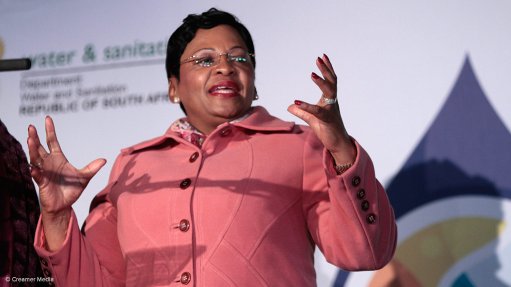
Water and Sanitation Minister Nomvula Mokonyane
Addressing a delegation at an Orange-Senqu River Basin Commission (Orasecom) meeting in Kempton Park, Gauteng, on Friday, Water and Sanitation Minister Nomvula Mokonyane highlighted the need for access to water as a serious challenge facing South Africa, as water security is necessary and essential for economic growth and development.
Mokonyane noted that Orasecom, established in 2000 by the governments of South Africa, Lesotho, Botswana and Namibia to manage the transboundary water resources of the Orange-Senqu River basin, supports the nexus approach to climate resilience, where energy security through hydropower generation, as well as food security, is supported through irrigation development – something South Africa depends heavily on.
“Orasecom initiatives ensure effective and efficient use of our scarce and limited water resources, in a manner that will ensure the economic and social wellbeing of our future generations,” she said.
Mokonyane added that the centrality of water to South Africa’s socioeconomic growth and development could not be underestimated.
“We are currently faced with an added complexity in the form of a changing climate and we may have to consider adaptive approaches and other innovative interventions to address new and future water-related challenges.”
Mokonyane pointed out that Orasecom had invested a lot of resources and energy into finding solutions to these problems and emphasised that there was a need for “doing things differently and advancing behavioural change” as the country recovers from the devastating drought.
“I hope we will always remember that the effects of climate change are threatening to reverse all our benevolent efforts. Climate change acts as the driver of many changes in water resource availability, with the effects of climate change often resulting in floods and droughts,” she said.
Mokonyane further highlighted that related problems included inefficiencies in water use, as well as inequality in terms of access to water, owing to the historical injustices of the past.
“We are looking forward to implementing new measures, which will hopefully lead to improved access to water services by all our people, as well as the enhanced protection of our very limited and scarce water resources.”
Also speaking at the event, Botswana Minister of Land Management, Water and Sanitation Services Prince Maele noted that climate change remained a significant risk for the Southern African Development Community (SADC) and the SADC community’s quality of life.
“The Paris Agreement, an agreement within the UN Framework Convention on Climate Change dealing with greenhouse gas emissions and finance starting in the year 2020, provides the framework needed to respond to climate change,” he noted.
Maele added that various countries were working hard to shift their attention to how they intended to implement commitments contained in their national determined contributions and that the agriculture sector was mentioned as one that could be transformative in the response to climate change.
“This could be through investments in productive, sustainable and resilient agriculture development. For this to be expedited, we cannot ignore water for agriculture and, in Botswana’s case, land also,” he concluded.